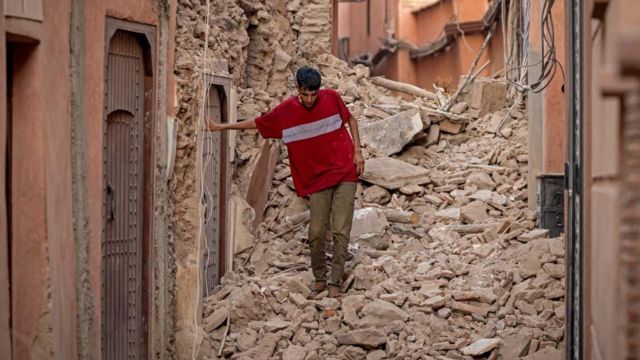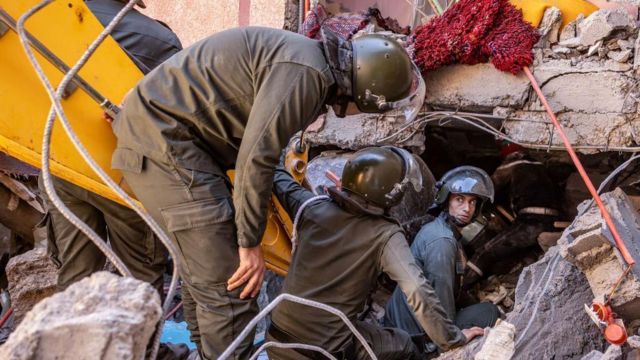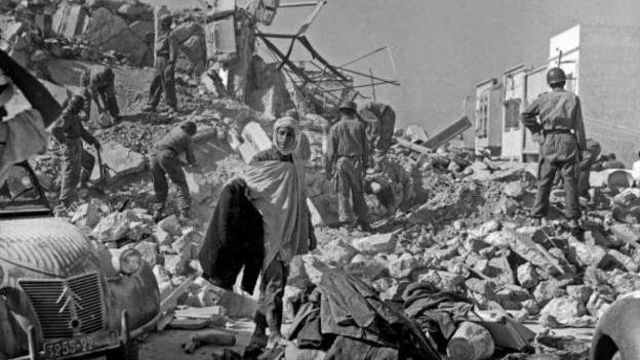What is known about the earthquake in Morocco that has left more than 1,000 dead
Marrakesh resident walks on rubble after earthquake
The death toll after a strong earthquake hit central Morocco has reached 1,037, according to the country's Interior Ministry.
The earthquake — measuring 6.8 — sent people running into the streets of Marrakech and other nearby cities.
An aftershock, magnitude 4.9, was felt 19 minutes later.
Many of the deaths occurred in difficult-to-access mountainous areas. There are also records of 1,200 injuries, many of them in serious condition, and reports of people trapped in rubble.
Moroccan reporter Aida Alami grew up in Marrakech and has kept in touch with her parents, who live in the city. She says the earthquake was completely unexpected.
“It is not a country where people know what to do in case of earthquakes. People just stay outside. They were really worried about the aftershocks and didn’t know what to do and no one was telling them what to do,” she said.
“Some of the shocking images we saw this morning are of the ancient walls that surround the old city."
“And we’re seeing rubble and a lot of destruction inside. They are very old buildings, they were probably not built solidly enough.”
João Fellet tries to understand how Brazilians reached their current level of division.
Episodes
End of Podcast
The Brazilian Embassy in the capital Rabat issued a statement saying that there is no news at this time of any dead or injured Brazilians and that it is closely monitoring the developments of the earthquake.
It was reported that the diplomatic corps in the country "works on duty, and can be contacted by phone +212661168181 (including WhatsApp)".
The Brazilian Olympic team delegation, made up of players up to 23 years old, is in the city of Fez, where they played a match against the Moroccan team.
The Brazilian Football Confederation (CBF), according to GloboEsporte, reported that the members of the delegation were taken to the hotel swimming pool and returned to their room an hour after the initial tremor.
The epicenter of the earthquake was in the High Atlas Mountains.
Journalist Alice Morrison is in the region and told the BBC that the scene is "apocalyptic", with "rocks everywhere, gigantic holes" and cracks in the ground.
Most of the victims were in Marrakech and several areas to the south, according to the Interior Ministry.
Hospitals in the city are receiving a large number of victims and authorities are asking for blood donations to be made at this time.
A cloud of dust was seen atop the historic 850-year-old Koutoubia Mosque in Marrakech. People at the scene feared there could be a risk of collapse.
The tremor also affected the governorates and municipalities of al-Haouz, Ouarzazate, Azilal, Chichaoua and Taroudant.
The earthquake was still felt in the capital Rabat, around 350 km away, as well as in the cities of Casablanca and Essaouira.
'Shock and Panic'
“We felt a very violent tremor and I realized it was an earthquake,” Abdelhak El Amrani, a 33-year-old man from Marrakech, told the AFP news agency.
"I could see the buildings shaking. So I went out and there were a lot of people in the street. People were in shock and panic. Children were crying and parents were distraught.
“The electricity went out for 10 minutes, as did the (telephone) network, but then it came back on. Everyone decided to stay outside,” he said.
In an interview with BBC Radio 4's Today programme, British journalist Martin Jay, who lives in Morocco, said: "There were reports in the Moroccan media warning people not to return to their homes."
“This was a national message released by authorities."
"It was a strange night [in] almost every city in Morocco, [where] most people sat on the ground outside their houses or apartment buildings because they were afraid of the second earthquake that they predicted would occur two hours later."
Rescue work in Moulay Brahim, Al Haouz Governorate
The city of Marrakech was greatly affected
From the information available so far, Marrakech appears to have been hit hard. The historic heart of the city is a UNESCO world heritage site.
Unverified videos on X (formerly Twitter) show damaged buildings, other buildings shaking and streets covered in rubble.
People were seen running in alarm and some walking through clouds of dust.
Some buildings in Marrakech's old city collapsed, a resident told Reuters news agency.
Several clips on X show buildings collapsing, but the BBC has not identified precisely where they were recorded.
Biggest earthquake in decades
Morocco has witnessed some strong earthquakes in the past, including one in 2004.
19 years ago, an earthquake hit the city of Al Hoceima, in northeastern Morocco, and killed 628 people.
In 1960, the Agadir earthquake killed 12 thousand people.
These numbers give an indication of the scale of casualties we could see from the earthquake that occurred last Friday.
According to Jonathan Aman, science reporter at BBC News, few earthquakes of magnitude 6.8 were expected this year and not in Morocco.
Most of the tectonic activity in this region occurs in the Mediterranean, and towards Turkey, which suffered a violent earthquake earlier this year.
Surprise has consequences due to the lack of adequate preparation for this type of event.
At least 12,000 people died in the earthquake that hit Agadir in March 1960
World leaders show solidarity
Leaders from several countries sent messages of condolence after receiving news of the tragedy.
French President Emmanuel Macron says he is “devastated” by the news and added that his country is ready to help with relief efforts.
Vladimir Putin stated that Russia shared “the pain and mourning of the friendly Moroccan people”.
Volodymyr Zelensky of Ukraine sent his "deepest condolences" to Morocco.
Spanish Prime Minister Pedro Sánchez wrote on X, formerly Twitter: “All my solidarity and support for the people of Morocco after this terrible earthquake.”
Turkish Recep Tayyip Erdogan, whose country was hit by a tragic earthquake earlier this year, declared that he was ready to offer help.
Israeli Prime Minister Benjamin Netanyahu “gave instructions to provide all necessary assistance to the Moroccan people,” according to a press release from his office.
And the African Union expressed its “great pain” at the “tragic consequences” of the earthquake.






No comments:
Post a Comment